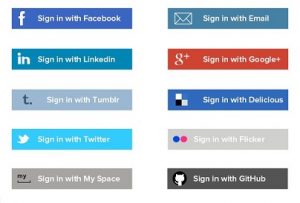How Social Media Making Irritating Login Process Comfortable !

Nowadays social identities are becoming an integral part of a web presence that deals with different activities. With the advancement of technology, most of the traditional transactional activities have been lifted to the web like shopping in e-commerce portal, Travel booking for Bus, Train, Flight, Hotel reservation in holiday destination etc. Merchandisers involve in above businesses, host their own web portal to facilitate the services.
When a visitor browses to a web portal, it is mandatory to create his new account for registration, for posting a comment, to create a wish list, contribute to a community, and much more. Nowadays, all noted e-newspapers want to have an account to react the news what they publish on e-paper. Because of the speedy momentum of digitalization, a maximum number of visitors already maintains accounts on several different social networks like Facebook, Twitter, LinkedIn Google+ etc, along with an email account from Gmail, Yahoo! etc and would prefer not to set up another username and password into that specific portal. Of course, it’s cumbersome to fill up the complete registration page to get an account registered.
According to researchers, 86% of people would prefer to leave a site rather than creating a new account. Visitors prefer to connect their social profile with the website using their social login to skip the registration form fill steps. This makes the process very fast, quick and easy. During the social login authentication process, visitors provide merchandisers access to their social profile data from those accounts. Merchandisers can leverage the rich data held in social profiles to promote advertisement, campaigning etc. That social profile not only contains information like name, email address, gender and date of birth, but also includes interests, activities, jobs, and their social graph. Besides, merchandisers can send greetings emails to the users on various occasions to keep them engaged with the portal.
Facebook has provided a very simple plug-in so that it can be easily integrated with the web portal. Once users enter their login credentials, data would travel to the Facebook for authentication. If authenticated then a token will be sent back to the web portal based on which, the web portal will allow the user to log in.
Gigya, a leader in customer identity management provides a comprehensive platform that can be integrated with the web portal. Using former, user would get an option to choose their favourite social identity to log in. Besides, 50% code development can be reduced in the web portal to facilitate above.
